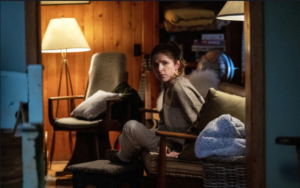ALICE, DARLING: 3 STARS. “Kendrick’s work gives the movie its power.”
 “Alice, Darling,” a new psychological drama starring Anna Kendrick, now on VOD and in select theatres, is a portrait of a woman who rediscovers both her essence and courage in the aftermath of an emotionally abusive relationship.
“Alice, Darling,” a new psychological drama starring Anna Kendrick, now on VOD and in select theatres, is a portrait of a woman who rediscovers both her essence and courage in the aftermath of an emotionally abusive relationship.
Kendrick is Alice, a young woman under the control of her emotionally manipulative artist boyfriend Simon (Charlie Carrick). In the film’s opening scene, she is out for dinner with best pals Sophia (Wunmi Mosaku) and Tess (Kaniehtiio Horn), but is anxious, agitated, repeatedly checking her phone and bristling when her friends joke about the waiter having a thing for her.
When the three plan a remote weekend get-a-way to celebrate Tess’s birthday, Alice lies to Simon and spends the whole time on tenterhooks.
“You can’t tell your life partner that you’re going on a trip with our best friends?” asks Tess. “I can’t think of a bigger red flag than that.”
“I don’t know how any of this is any of your business,” replies Alice.
Tensions between the friends bubble over during the time away until Alice comes clean about the nature of her relationship with Simon.
“You never know what is going to make him angry,” she says. “I spend all this time trying to be good. Trying to be better. I’m never good enough.”
Just as it seems the clouds have lifted and smiles appear on their faces for the first time in days, Simon, who has been unable to reach Alice, shows up at their cabin. “You look different,” he says. “She looks like herself,” say her friends.
In a brisk ninety-minute running time, “Alice, Darling” conveys the warning signs of Simon’s gaslighting, and the effect it has on Alice. Simon’s brand of abuse is insidious. “He doesn’t hurt me or anything,” she says. But he does get into her head, using his narcissism like a shroud to cloak her own feelings and desires. Simon’s actual role in the film, in terms of screen time, is fairly brief, but his presence is felt throughout.
Carrick personifies the kind of malevolent, arrogant jerk who demands to know, “Why would you hurt me like this?” at the slightest of provocation, but it is Kendrick’s work that gives the movie its power. In a performance that mixes the introspective with the physical, she portrays Alice’s turmoil. From pulling her own hair out, to her hollow-eyed stare, Kendrick is an authentic and believable victim of Simon’s brainwashing.
Director Mary Nighy (daughter of recent Best Actor nominee Bill) relies on Kendrick to carry “Alice, Darling’s” weight. The film wraps things up a bit too tidily at the end, but the power of Alice’s story remains undiminished.
